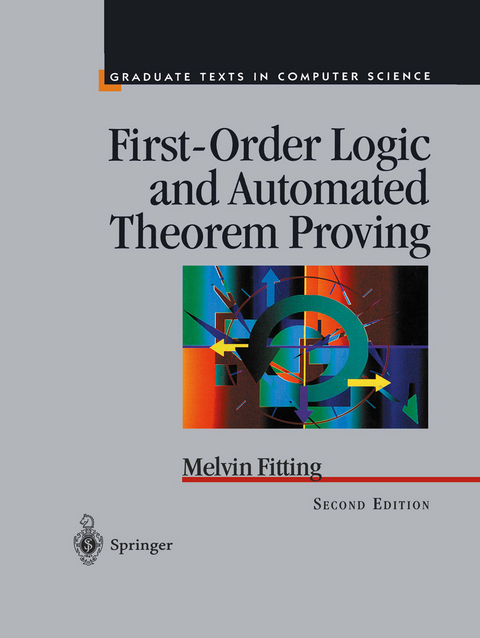
First-Order Logic and Automated Theorem Proving
Springer-Verlag New York Inc.
978-1-4612-7515-2 (ISBN)
There are many kinds of books on formal logic. Some have philosophers as their intended audience, some mathematicians, some computer scien tists. Although there is a common core to all such books, they will be very different in emphasis, methods, and even appearance. This book is intended for computer scientists. But even this is not precise. Within computer science formal logic turns up in a number of areas, from pro gram verification to logic programming to artificial intelligence. This book is intended for computer scientists interested in automated theo rem proving in classical logic. To be more precise yet, it is essentially a theoretical treatment, not a how-to book, although how-to issues are not neglected. This does not mean, of course, that the book will be of no interest to philosophers or mathematicians. It does contain a thorough presentation of formal logic and many proof techniques, and as such it contains all the material one would expect to find in a course in formal logic covering completeness but, not incompleteness issues. The first item to be addressed is, What are we talking about and why are we interested in it? We are primarily talking about truth as used in mathematical discourse, and our interest in it is, or should be, self evident. Truth is a semantic concept, so we begin with models and their properties. These are used to define our subject.
1 Background.- 2 Propositional Logic.- 2.1 Introduction.- 2.2 Propositional Logic—Syntax.- 2.3 Propositional Logic—Semantics.- 2.4 Boolean Valuations.- 2.5 The Replacement Theorem.- 2.6 Uniform Notation.- 2.7 König’s Lemma.- 2.8 Normal Forms.- 2.9 Normal Form Implementations.- 3 Semantic Tableaux and Resolution.- 3.1 Propositional Semantic Tableaux.- 3.2 Propositional Tableaux Implementations.- 3.3 Propositional Resolution.- 3.4 Soundness.- 3.5 Hintikka’s Lemma.- 3.6 The Model Existence Theorem.- 3.7 Tableau and Resolution Completeness.- 3.8 Completeness With Restrictions.- 3.9 Propositional Consequence.- 4 Other Propositional Proof Procedures.- 4.1 Hilbert Systems.- 4.2 Natural Deduction.- 4.3 The Sequent Calculus.- 4.4 The Davis-Putnam Procedure.- 4.5 Computational Complexity.- 5 First-Order Logic.- 5.1 First-Order Logic—Syntax.- 5.2 Substitutions.- 5.3 First-Order Semantics.- 5.4 Herbrand Models.- 5.5 First-Order Uniform Notation.- 5.6 Hintikka’s Lemma.- 5.7 Parameters.- 5.8 The Model Existence Theorem.- 5.9 Applications.- 5.10 Logical Consequence.- 6 First-Order Proof Procedures.- 6.1 First-Order Semantic Tableaux.- 6.2 First-Order Resolution.- 6.3 Soundness.- 6.4 Completeness.- 6.5 Hilbert Systems.- 6.6 Natural Deduction and Gentzen Sequents.- 7 Implementing Tableaux and Resolution.- 7.1 What Next.- 7.2 Unification.- 7.3 Unification Implemented.- 7.4 Free-Variable Semantic Tableaux.- 7.5 A Tableau Implementation.- 7.6 Free-Variable Resolution.- 7.7 Soundness.- 7.8 Free-Variable Tableau Completeness.- 7.9 Free-Variable Resolution Completeness.- 8 Further First-Order Features.- 8.1 Introduction.- 8.2 The Replacement Theorem.- 8.3 Skolemization.- 8.4 Prenex Form.- 8.5 The AE-Calculus.- 8.6 Herbrand’s Theorem.- 8.7 Herbrand’s Theorem, Constructively.-8.8 Gentzen’s Theorem.- 8.9 Cut Elimination.- 8.10 Do Cuts Shorten Proofs?.- 8.11 Craig’s Interpolation Theorem.- 8.12 Craig’s Interpolation Theorem—Constructively.- 8.13 Beth’s Definability Theorem.- 8.14 Lyndon’s Homomorphism Theorem.- 9 Equality.- 9.1 Introduction.- 9.2 Syntax and Semantics.- 9.3 The Equality Axioms.- 9.4 Hintikka’s Lemma.- 9.5 The Model Existence Theorem.- 9.6 Consequences.- 9.7 Tableau and Resolution Systems.- 9.8 Alternate Tableau and Resolution Systems.- 9.9 A Free-Variable Tableau System With Equality.- 9.10 A Tableau Implementation With Equality.- 9.11 Paramodulation.- References.
| Reihe/Serie | Texts in Computer Science |
|---|---|
| Zusatzinfo | XVIII, 326 p. |
| Verlagsort | New York, NY |
| Sprache | englisch |
| Maße | 170 x 244 mm |
| Themenwelt | Mathematik / Informatik ► Informatik ► Theorie / Studium |
| Mathematik / Informatik ► Mathematik ► Allgemeines / Lexika | |
| Mathematik / Informatik ► Mathematik ► Logik / Mengenlehre | |
| ISBN-10 | 1-4612-7515-6 / 1461275156 |
| ISBN-13 | 978-1-4612-7515-2 / 9781461275152 |
| Zustand | Neuware |
| Haben Sie eine Frage zum Produkt? |
aus dem Bereich


